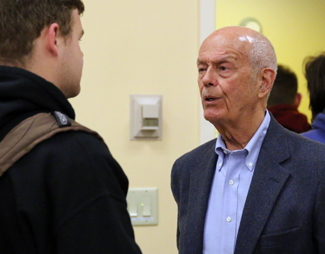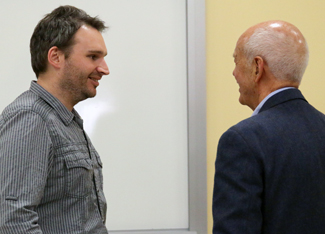Admiral Bobby R. Inman, US Navy, presented “Inman’s View of the World” to Wabash students on Tuesday night. The former Director of the NSA and Deputy Director of the CIA covered a wide variety of international issues in just one hour. Inman told the audience that he believed an understanding of the world was crucial for all students.
.jpg) “You’re going to be going into a world of a global economy,” Inman said. “There is no going back to a domestic economy. And therefore, understanding the rest of the world – how it works, how we interact – is an understanding that you need to acquire and pursue for the rest of your adult life. Because understanding what’s going on in places where you want to market a product or want to make sure your company doesn’t go could be critical for your long-term success.”
“You’re going to be going into a world of a global economy,” Inman said. “There is no going back to a domestic economy. And therefore, understanding the rest of the world – how it works, how we interact – is an understanding that you need to acquire and pursue for the rest of your adult life. Because understanding what’s going on in places where you want to market a product or want to make sure your company doesn’t go could be critical for your long-term success.”
Inman had a captive audience. Many students, such as Joe Mount ’15 showed up to hear the Admiral speak.
“I decided to attend Admiral Inman's talk because I was interested in the opinions of a person who has been in charge of one of the foremost intelligence agencies in the world,” Mount said. “He's been exposed to aspects of politics that we can't even imagine, and knows about situations that we only think happen on TV. His view on the world had to be worth some inquiry.”
Inman began with a list of the his five most important world threats. He said the most important threat in the world today is the proliferation of nuclear weapons. He mentioned that in the past, countries have only built nuclear weapons for defensive purposes, but North Korea and Iran could potentially sell the weapons to the highest bidder or instigate an attack on Israel. Inman also mentioned that global terrorism, cyber threats, international narcotics, and pandemic epidemics could threaten the world’s stability and security.
 Inman then to new technological developments in Mexico as well as fracking in the United States and the implications.
Inman then to new technological developments in Mexico as well as fracking in the United States and the implications.
“There is a valid prospect for the first time in my adult life that North America could be energy independent,” Inman said. “Not dependent on Venezuela, not dependent on the African countries, not dependent on the Persian Gulf.”
Inman then moved to the issue of Syria. He looked at the country from a long-term perspective, and stressed the importance of sending help to Syrian refugee camps.
“Future leaders of Syria are probably in those refugee camps,” Inman said. “The degree to which they get a chance for an education and the chance to look favorably upon the West will probably shape attitudes from Syria toward the rest of the world 20 years from now. What is doable is to go work inside those refugee camps and make sure that education and opportunities are there for those that will be the future leaders.”
He then moved to Russia and its president, Vladimir Putin.
“Mr. Putin just doesn’t like us,” Inman said to a chuckling audience. “He blames us for the collapse of the Soviet Union. He believes we deliberately humiliated Russia. He is determined to restore them to being considered a great power.”
Inman does not believe the world has seen the last of Russian aggression in the region.
“I have been telling my colleagues to expect that what we would see next is an effort to bring down the government of Kiev [the capital of Ukraine], and if that failed, then a move toward separation of country and moving to take over Eastern Ukraine,” Inman said. “I think he has recently realized that he can’t topple the government, so I believe he is moving to create a whole separate country. And if he is successful with that, where does his appetite take him next?”
 As the former Director of the NSA, Inman offered unique opinions on government secrecy.
As the former Director of the NSA, Inman offered unique opinions on government secrecy.
“Knowledge is power,” Inman said. “Particularly if you know things others don’t, you will be more secretive. And it was that reluctance to talk that played a significant role in not putting facts together before 9/11. And I’m not persuaded that reluctance to talk is gone. I watched the Russians give us usable intelligence on the leader of the Boston Marathon bombing. It never got shared, so we couldn’t identify the hostile intent.”
But Inman seemed to believe some secrecy is necessary, and the fallout from revealing secret government programs can hurt antiterrorism efforts by making it harder to track potential terrorists.
“More worrisome to me, in the wake of Mr. Snowden and all of the disclosures about targets, is that I’m told that people who were being tracked have stopped communicating,” Inman said.
The Admiral gave an expert’s insight on many hot issues in the current political world that could not be found elsewhere on campus. But as Wabash students are taught to do, many formed their own opinions on the hot issues Inman discussed.
“There were some ideas I took issue with,” Christian Lopac ‘16 said. “While such are matters of opinion spanning several intellectual areas, I found the Admiral's emphasis on the American government influencing economies throughout the world and intervening in other forms as problematic. The Admiral's speech was highly interesting and evidenced a wealth of knowledge, but it also seemed that he equated opposing economic or other forms of intervention as isolationist in nature.”
Inman concluded by warning that the United States needs to maintain an active presence in the world.
“It’s a fascinating world,” Inman said. “It does need US leadership. It doesn’t mean that we’ve got to be the policemen of the world, but it does mean that we need to actively ensure that there is a stable, peaceful world. And if we instead take the track of simply pulling back, history tells us that what that’s likely going to produce is a lot of turbulence in the long-term.”